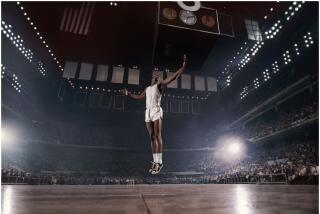With Experimentalist Collins, the Unusual Is Often Delightful
- Share via
Among other things, experimentalist Nicolas Collins’ performance at CalArts on Wednesday posed this musical question: At what point does a skipping CD player stop being a disruption of cultural reality to become an enticing reality all its own? In the piece called “Still Lives,” a CD player is programmed to skip, slowly tracing several measures of music by composer Giuseppe Guami (1540-1611), while Collins recited text from writer Vladimir Nabokov’s memoirs. The result: enchanting, maverick music.
Part of the CalArts Musical Explorations 2000! series, the New York-born Collins’ appearance was very much a live, real-time experience, a contrast with the sometimes dry experience of electronic and computer music presented on tape or, lately, coaxed from a laptop. Here, in addition to the skipping CD player, Collins played his rewired lap steel guitar, its pickups agitating the strings into feedback-like, overtone-rich squalls, and, on “Strange Heaven,” he played a trombone refitted as a triggering system for synthetic sounds.
Collins, like his teacher Alvin Lucier, challenges assumptions about the tradition of physical instruments and musical form. His pieces manage to be at once abstract, meditative and delightfully harebrained. Yet they’re also often tethered to accessible texts, intoned with halting, ironic cadences reminiscent of Robert Ashley and Laurie Anderson.
The first half featured pieces from a series based on writings and testimonies of blind and deaf people, with an underlying theme of not taking senses for granted--just as Collins doesn’t take the notion of instruments and sound schemes for granted. As he wryly admitted, he’s a “champion of the New Maudlinism,” and sometimes his word schemes are a nuisance, a reflexively emotive point of focus that impinges on more abstract sonic splendor.
The evening’s strongest material heeded a more purely musical language. The text in “Sonnet 40,” for instance, was from Shakespeare, but the work required trumpeter Glen Whiteread to “read” the text with varied effects.
An actual human string quartet joined in for the closer, “Stormy Weather,” interacting and triggering the “backwards guitar,” and producing a scabrous, beautiful wall of overtones. No words were necessary.
More to Read
The biggest entertainment stories
Get our big stories about Hollywood, film, television, music, arts, culture and more right in your inbox as soon as they publish.
You may occasionally receive promotional content from the Los Angeles Times.










